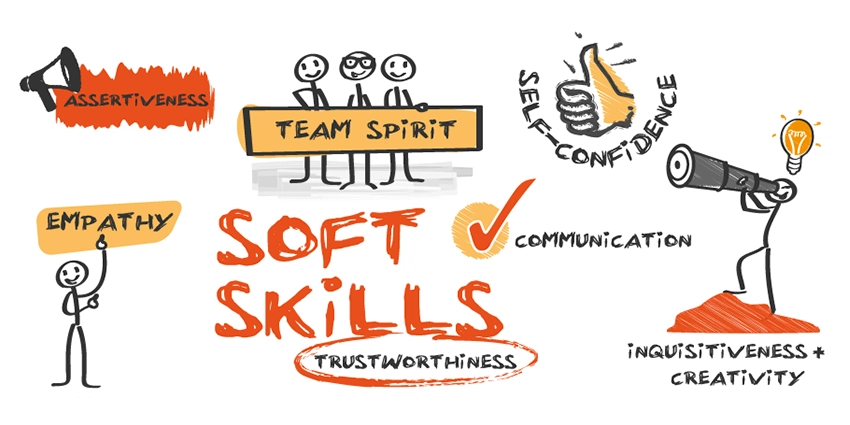🧠 “I’d rather debug Python than people.”
Said every burnt-out engineer ever. But here’s the brutal truth: Your technical skills get you hired. Your soft skills get you promoted.
We spend years mastering programming, AI, data science, or cloud engineering. But when it comes to communication, influence, and leadership, we often assume we’ll “figure it out.”
Here’s the truth: Soft skills are the hardest skills to master. Also, they are the most rewarding ones.
💡 The Technical Paradox
In my 15+ years working with engineering teams, and mentoring 50+ developers, I’ve observed a recurring pattern: we approach technical skills with very disciplined learning methodologies, structured practice, and continuous improvement frameworks. Yet for interpersonal skills, we rarely apply the same rigor.
Why this disconnect? Perhaps because technical skills have clear metrics for success – the code either runs or it doesn’t. Soft skills exist in the messy, ambiguous realm of human interaction where feedback is subjective, and progress isn’t easily measured in Jira stories and Git commits.
I’ve seen genius coders stuck in mid-level roles, away from leadership – because they couldn’t:
-
Convince stakeholders their idea mattered.
-
Navigate a teammate’s ego without rage-quitting Skype, Zoom or Meet.
-
Sell a $1M project without putting investors to sleep.
Soft skills aren’t “fluff”—they’re force multipliers for your career. Read on to understand why they’re so damn hard.
🔍 What Makes Soft Skills So Challenging?
These skills demand an entirely different mental framework:
🔹 Emotional Intelligence ≠ Common Sense – It requires understanding people, not just data. Recognizing that humans don’t follow predictable algorithms and that each person brings their unique context to every interaction.
-
Scenario: “Why is the PM mad? I just told them their idea was statistically stupid.”
-
Reality: EQ means framing feedback as “Let’s align with the data” vs.“Your suggestion is nonsense.”
🔹 Active listening – Not just waiting for your turn to speak. Truly absorbing not only what someone says, but what they mean – often requiring us to silence our internal problem-solving dialogue to fully attend to others.
- Pro Tip: Next meeting, say “Let me summarize…” before pitching your idea. Watch magic happen.
🔹 Influence & persuasion – Getting buy-in without authority. Technical correctness rarely wins arguments alone; you must connect solutions to what others value and communicate in their language, not yours.
- Script for win: “What if we pilot this and measure impact? Low risk, high reward.” Instant buy-in.
🔹 Empathy & adaptability – Navigating workplace dynamics. Understanding that different stakeholders have different priorities and adjusting your approach accordingly- often on the fly during high-pressure situations.
🔹 Conflict Resolution ≠ Avoiding Conflict – Managing egos, not just algorithms. Addressing tensions directly while preserving relationships, which often requires vulnerability that can feel deeply uncomfortable for analytical thinkers.
-
Ignoring tension = tech debt for relationships.
-
Fix*: “I sense we’re misaligned. Let’s find a win-win.” (Yes, it’s cringe. **And Yes*, it works!)
🚧 The Career Limitation Few Discuss
Engineers with technical brilliance hit invisible ceilings in their careers – not because they couldn’t master Kubernetes or implement complex machine learning models, but because they struggled with:
-
Explaining complex concepts to non-technical stakeholders
-
Building consensus across teams with competing priorities
-
Reading the room during crucial presentations
-
Managing upward and setting appropriate expectations
-
Giving constructive feedback without damaging relationships
As a senior engineer told me recently: “I spent a decade becoming an expert in distributed systems, only to discover that my inability to navigate organizational politics was the real barrier to implementing my ideas.”
🌱 The Growth Mindset for Soft Skills
The good news? These skills follow learning curves just like technical ones. They can be systematically developed with the right approach:
✅ Treat feedback as debugging input – When someone says you came across as dismissive in a meeting, don’t defend – investigate. What specific behaviors created that perception?
✅ Practice storytelling deliberately – Whether in emails, documentation, or presentations, focus on narrative structure. What problem are you solving? Why does it matter? What’s the journey to resolution?
✅ Study communication patterns – Observe leaders you admire. What techniques do they use to simplify complex ideas? How do they handle objections? What questions do they ask to uncover unstated concerns?
✅ Seek “code reviews” for your communication – Ask trusted colleagues to review important emails or presentation outlines before sending, just as you would do for your technical work.
✅ Embrace psychological safety – Foster environments where team members can admit mistakes, ask “dumb” questions, and express concerns without fear—starting with modeling this behavior yourself.
🪜 My Personal Journey
Early in my career, I believed technical excellence would speak for itself. I learned the hard way that being right doesn’t matter if you can’t bring others along with you. My most painful lessons came from watching technically inferior solutions win because their champions were better at building coalitions and communicating value.
The most transformative practice I developed was simply this: before any significant interaction, I began asking myself not just “What do I need to communicate?” but “What does this person need to hear, and how can I frame my message in their context?”
This simple shift in perspective – from sender-focused to receiver-focused communication – has unlocked more opportunities than any technical certification I’ve ever earned.
🚀 Top 3 Quick-Picks on How to Level Up (Without Cringing)
-
Practice “Mirroring”: Repeat the last 3 words someone says (“So the deadline’s unrealistic…”). Instant rapport.
-
Turn Emails into Stories: Ditch “Per my last email” for “Here’s why this matters…”
-
Join Improv or Toastmasters: Yes, they do help if you need it, really.
What’s the toughest soft skill you’ve had to master? Which interpersonal challenge has taught you the most valuable lesson in your technical career? Let’s learn from each other’s journeys! 👇
#Leadership #CareerGrowth #SoftSkills #EmotionalIntelligence #TechLeadership #CommunicationSkills #EngineeringCulture #ProfessionalDevelopment #DeveloperRelations

